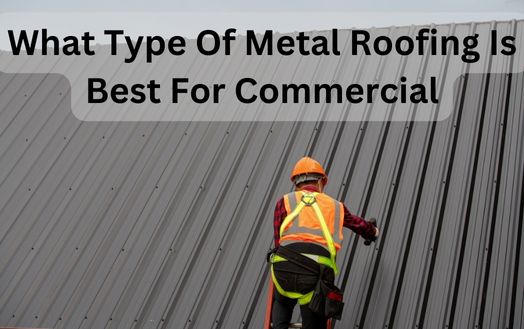
Metal roofing is becoming an increasingly popular choice for commercial buildings. Its durability, longevity, and energy efficiency make it an attractive option for commercial property owners. However, not all metal roofing is created equal, and knowing which type of metal roofing is best for commercial projects is crucial. In this blog, we will explore what type of metal roofing is best for commercial, their benefits, and factors to consider when choosing a commercial roofing contractor NJ. Whether you’re constructing a new commercial building or looking to replace an existing roof, understanding the options available to you will help you make an informed decision and ensure the long-term success of your project.
When it comes to commercial metal roofing, there are several types to choose from, each with its own advantages and characteristics. Two of the most common types are metal shingles and standing seam metal roofs. Metal shingles offer versatility, durability, and minimal maintenance, making them an ideal choice for commercial buildings. On the other hand, standing seam metal roofs are known for their durability, longevity, and sleek, modern appearance. Both types of metal roofing have their own unique features and benefits, and understanding the differences will help you make an informed decision for your commercial project.
Standing seam metal roofing has gained popularity in recent years, especially in commercial construction projects. It is known for its durability, longevity, and superior performance in high wind conditions. The standing seam system consists of raised panels that interlock vertically along the roof’s surface, providing a sleek, modern look. This design is not only aesthetically pleasing but also offers excellent protection against commercial leak repair NJ, as the raised seams prevent water penetration. Standing seam metal roofs require minimal maintenance and can withstand harsh weather conditions, making them a cost-effective choice for commercial properties.
One of the key advantages of standing seam metal roofing is its durability. The panels are made of high-quality metal, such as steel or aluminum, which can withstand the test of time. Unlike traditional roofing materials like asphalt shingles, standing seam metal roofs can last 40-70 years or more, significantly outperforming other options in terms of longevity. This longevity means that commercial property owners can enjoy a low-maintenance roofing system that requires minimal ongoing maintenance and replacement, saving costs in the long run.
In addition to its durability, standing seam metal roofing also offers energy efficiency benefits. The design of standing seam panels allows for insulation, reducing heat transfer and improving energy efficiency. This can result in lower energy costs for commercial buildings, especially in regions with extreme weather conditions. Furthermore, standing seam metal roofs can be coated with reflective coatings, further enhancing energy efficiency by reducing heat absorption. These energy-efficient properties make standing seam metal roofing an environmentally sustainable choice, contributing to commercial buildings’ green initiatives.
In summary, standing seam metal roofing’s durability, longevity, and energy efficiency make it an excellent choice for commercial buildings. Its sleek, modern appearance, minimal maintenance requirements, and cost-effectiveness further elevate its appeal. If you’re looking for a roofing system that can withstand the test of time and provide long-lasting value to your commercial property, standing seam metal roofing is definitely worth considering.
Another type of metal roofing commonly used in commercial buildings is corrugated metal roofing. This type of roofing consists of metal sheets with ridges and valleys, known as corrugations, which provide excellent strength and durability. Corrugated metal roofs can be made of various metals, including steel, aluminum, and zinc, giving commercial property owners flexibility in choosing the right material for their project.
One of the key benefits of corrugated metal roofing is its durability. Metal roofs, in general, are known for their longevity, and corrugated metal roofs are no exception. They can withstand harsh weather conditions, including high winds, heavy rain, and snow, without deteriorating or sustaining damage. This durability ensures that your commercial building remains protected for years to come, reducing the need for frequent commercial roof replacement NJ.
Another advantage of corrugated metal roofing is its longevity. While the lifespan of a corrugated metal roof can vary depending on factors such as the metal used, proper installation, and maintenance, it is not uncommon for corrugated metal roofs to last 40-60 years or more. Compared to traditional roofing materials like asphalt shingles, which typically last around 20 years, corrugated metal roofing offers a significantly longer lifespan, providing commercial property owners with a cost-effective and long-lasting roofing solution.
In addition to durability and longevity, corrugated metal roofing also offers other benefits, such as energy efficiency and minimal maintenance requirements. Metal roofs, including corrugated metal roofs, have excellent insulation qualities, helping to keep commercial buildings cool in hot climates and reducing energy consumption. Furthermore, corrugated metal roofs require minimal maintenance, typically limited to basic inspections, cleaning, and gutter checks, saving commercial property owners time and money on ongoing maintenance.
Overall, corrugated metal roofing’s durability, longevity, energy efficiency, and minimal maintenance requirements make it a popular choice for commercial buildings. Its ability to withstand harsh weather conditions, while providing long-term cost savings, ensures peace of mind for commercial property owners.
Metal shingles and tiles offer durability, versatility, and low maintenance for commercial properties. They can replicate the look of traditional roofing materials, providing diverse design options. Steel shingles and tiles deliver energy-efficient and resilient roofing solutions for commercial buildings. Choosing a metal shingle or tile system can be a cost-effective option. Additionally, they lend a modern and stylish appeal to commercial roofing, making them a popular choice for property owners.
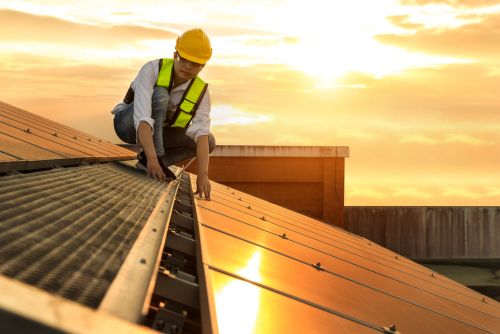
When considering commercial roofs, it’s essential to explore the various panel options available. Ribbed panels offer strength and durability, standing seam panels provide excellent water resistance, snap-lock panels ensure straightforward installation, and batten seam panels offer a distinct visual appeal. Each type serves a unique purpose, catering to different requirements for commercial spaces. Understanding the role of these panels is crucial for making informed decisions when investing in a new roof.
Ribbed panels represent a durable and cost-effective solution for commercial roof repair NJ . Their thickness and gauge can be customized to meet the demands of commercial projects, providing insulation and energy efficiency. Their versatility makes them suitable for various types of commercial buildings, and their efficient installation reduces job site time for commercial roofing contractors.
Standing seam panels offer commercial building owners a durable and low-maintenance roofing system that provides increased protection against leaks. The sleek, modern look of standing seam metal panels enhances the aesthetics of commercial properties, while their durability and longevity make them a cost-effective choice. Additionally, commercial metal roofing contractors can efficiently install these panels, reducing project time and providing building owners with a reliable new roof solution.
Snap-lock panels offer commercial property owners a durable and weathertight roofing system, ensuring long-term protection and stability. Their sleek and attractive design enhances the overall aesthetic appeal of commercial buildings, making them an excellent choice for roofing solutions. With minimal maintenance requirements, snap-lock panels present a cost-effective option for businesses looking to invest in a reliable roofing system. Additionally, their customizable nature allows for design versatility, catering to specific architectural preferences. Furthermore, the efficient installation process by commercial roofing company NJ reduces project time, minimizing disruptions to business operations.
For commercial properties, batten seam panels present a durable and high-performing roofing solution. Their design offers insulation and energy efficiency to buildings, tailored to specific project requirements. The thickness and gauge can be customized for the needs of commercial buildings, providing a modern and attractive roofing option.
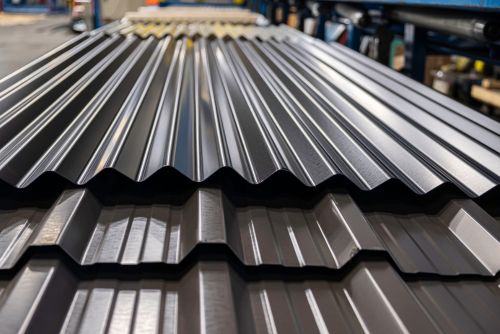
Metal roofs are a popular choice for commercial properties due to their numerous benefits. They offer exceptional durability, making them ideal for steep slope applications. Additionally, metal roofs come in various types such as seam metal roofing and roof tiles, providing versatility for different aesthetic preferences. Commercial roofs made of metal are also known for their fire resistance and minimal maintenance requirements, making them a reliable and cost-effective option for business owners. With their long lifespan and energy efficiency, metal roofs can provide substantial long-term savings for commercial property owners. Let us find out more what type of metal roofing is best for commercial.
When it comes to commercial roofing, the longevity of metal roofs is unparalleled. With an expected lifespan of 40 to 100+ years, metal roofs far outlast traditional roofing materials such as asphalt, which typically last a maximum of 20 years. The durability of metal roofing ensures minimal maintenance and replacement, leading to long-term cost savings. This longevity makes metal roofs an ideal investment for commercial buildings, lasting 40-70 years and maintaining structural integrity even in harsh weather conditions.
When considering commercial metal roofing, one key advantage is its exceptional fire resistance. Metal roofs provide superior protection to commercial buildings as they have a high melting point, reducing the risk of fire damage when compared to other roofing materials. Additionally, they are non-combustible, minimizing the potential spread of fire in case of an outbreak. This fire-resistant nature can lead to lower insurance premiums for commercial properties, making metal roofing a reliable choice for building owners prioritizing safety and protection.
Minimal upkeep is needed for commercial metal roofs, reducing long-term maintenance costs. This makes metal roofing an appealing choice for commercial property owners due to its ability to withstand environmental stressors. Basic inspections, cleaning, and gutter checks are typically all that’s required for routine maintenance. The minimal maintenance needs of metal roofing systems contribute to their cost-effectiveness, making them a practical option for commercial properties.
When considering commercial metal roofing, it’s essential to understand its impact on energy efficiency and environmental sustainability. Metal roofs offer reflective properties that reduce the need for excessive air conditioning, resulting in lower energy costs. Moreover, coatings can be applied to enhance energy efficiency, further reducing heating and cooling expenses. These energy-efficient features not only contribute to cost savings but also align with environmental sustainability efforts by reducing carbon footprint. Additionally, the insulation qualities of metal roofing play a crucial role in enhancing energy efficiency and promoting sustainability.
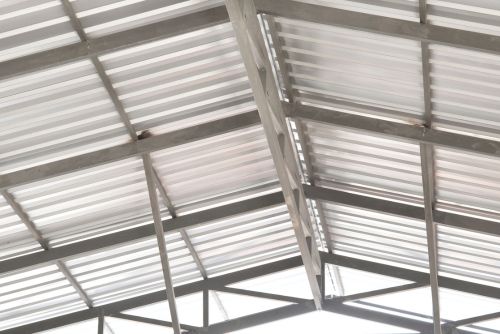
Commercial metal roofing is known for its exceptional strength and durability, making it a popular choice for many businesses. The different types of metal roofs offer varying degrees of strength and can withstand harsh weather conditions, including high winds and heavy snow. Metal roof coatings provide additional protection, further extending the longevity of the entire roof structure. Additionally, the use of substructural components ensures the stability and robustness of the commercial metal roof, making it a reliable and long-term solution for business owners.
Substructural components in commercial metal roofing are crucial for system durability and performance. These components, including the roof deck and underlayment, uphold the integrity of metal roofing systems, contributing to their longevity and reliability. The quality and correct installation of substructural components significantly impact the overall durability and effectiveness of metal roofing. Properly designed substructural components ensure the durability of commercial metal roofing, making them essential for a reliable and long-lasting new roof.
In areas prone to high winds, commercial metal roofing offers exceptional protection during severe weather events. Its robust design emphasizes resistance to uplift, making it ideal for buildings in high-wind zones. The utilization of seam panels and standing seam system further enhances the high wind resistance capacity of commercial metal roofing, ensuring the safety and security of commercial buildings. Additionally, the elevated wind resistance reduces the risk of damage, minimizing associated maintenance costs.
When considering commercial metal roofing, it’s essential to understand the significant role that metal roof coatings play. These coatings provide additional protection, enhancing durability and longevity. Reflective roof coatings also contribute to increased energy efficiency by reducing heat absorption, making them a valuable addition to any commercial building. Proper application extends the lifespan of these roofing systems while providing corrosion protection. Additionally, the application of metal roof coatings can enhance both the aesthetic appeal and functionality of commercial metal roofs, offering a comprehensive solution for long-term performance and protection.
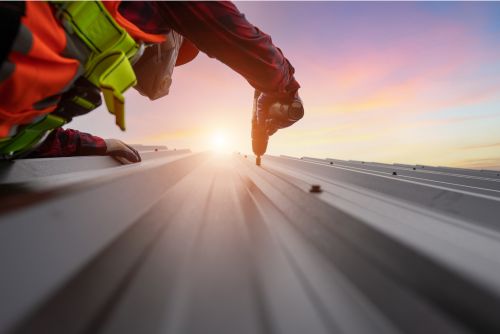
When selecting a commercial metal roofing contractor, experience and expertise are paramount. Thorough knowledge of local building codes and permits is necessary to ensure compliance. Additionally, consider their familiarity with different types of metal roofs such as zinc, copper, and slate. Understanding the factors contributing to the higher cost of certain roofing materials and the long-term benefits they provide is crucial in making an informed decision. The ability of the contractor to work with various types of roof tiles, wall panels, and downspouts is also essential for a successful project.
When selecting commercial metal roofing contractors, prioritize extensive experience and industry expertise. An experienced contractor offers valuable insights and recommendations, optimizing project outcomes and ensuring compliance with building codes. Their expertise directly influences the quality and durability of metal roofing installations, benefiting commercial property owners. Problem-solving skills and knowledge of experienced metal roofing contractors enhance the entire roof installation process, providing professional and approachable assistance to clients.
Adhering to local building codes ensures project compliance and guarantees safety and durability. Securing permits is crucial for legal and safety reasons, preventing costly rework. Proper understanding of codes leads to a successful project, while knowledge of local codes prevents errors. Compliance with codes is essential for a new roof or siding, ensuring the entire roof is up to standard.
Investing in commercial metal roofing entails significant cost considerations and a promising return on investment (ROI). The initial investment is higher due to the types of metal roofs, such as zinc, copper, and slate. However, the long-term savings, along with minimal maintenance requirements, make it a feasible choice for homeowners. Moreover, the durability and energy efficiency of commercial metal roofs contribute to a substantial ROI. Understanding these factors will help in making an informed decision when opting for a new roof.
When considering commercial roofing options, it’s important to weigh the initial investment against long-term savings. Metal roofing stands out for its durability, minimizing the need for ongoing maintenance. Additionally, the energy efficiency of metal roofing contributes to lower long-term energy costs. With a long lifespan, metal roofing ensures substantial long-term cost savings. Its minimal maintenance requirements further translate into tangible financial benefits for businesses. Making an informed decision about your commercial roof can lead to significant long-term savings.
Factors affecting metal roofing costs include the material, gauge, and design. Additional features like coatings and insulation also impact costs. The complexity of installation, roof design, slope, and size contribute to overall expenses. Opting for professional installation can minimize long-term maintenance costs, making it a worthwhile investment.
Misconception: Commercial metal roofing is often seen as too costly, but it offers long-term savings and durability. Contrary to belief, metal roofing can be installed on flat roofs and comes in various designs for versatility. Additionally, with proper installation and maintenance, metal roofs are not prone to leaks or rust and can be energy-efficient.
In conclusion, when it comes to commercial metal roofing, there are several options to consider. Each type offers unique benefits and advantages for your building. Standing seam metal roofing provides a sleek and modern look, while corrugated metal roofing offers excellent durability and weather resistance. Metal shingles and tiles add a touch of elegance and versatility to your roof. The choice ultimately depends on your specific needs and preferences.
Commercial metal roofs offer numerous advantages, including longevity, fire resistance, minimal maintenance requirements, and energy efficiency. They are built to withstand harsh weather conditions and provide long-term durability. It’s important to choose a reputable and experienced metal roofing contractor who understands local building codes and permits.
While the initial investment in commercial metal roofing may be higher, the long-term savings and return on investment make it a cost-effective choice. Don’t be swayed by common misconceptions about metal roofing – it is a reliable and efficient option for commercial buildings.
If you’re considering a commercial metal roof, consult with a professional contractor who can guide you through the process and help you make the best decision on what type of metal roofing is best for commercial.